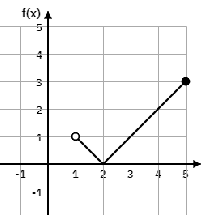The domain and range.

WHAT IS D:(1,5] and R:[0,3]?
The graph of this function is a parabola.
What is a quadratic function?
The highest power of the variable in a polynomial function.
What is the degree of a polynomial?
What are the zeros?
Logarithms are inverse functions of this kind of function.
What are exponential functions?
Let ƒ(x) = 2 + sgrt(x+1) and g (x) =2x - 4.
Find f(g(6)).
f(g(8)) = 5
When a function hits the x-axis, it is this kind of characteristic.
What is a root (or zero, or x-intercept)?
This function's end behaviors are the opposite.
This is a function with an odd degree.
These are found by dividing the leading term in the numerator by the leading term in the denominator.
What are the horizontal asymptotes?
Rewrite the following as an exponential.
logbx=y
What is by=x?
The inverse of f(x) = x^2 -4
f-1(x) = sqrt(x+4)
When a function goes straight through a root, it is said to be this kind of root.
What is a single root?
These are created when you can reduce a factor from the numerator and denominator.
What are holes?
You want to do this first when creating a table of values of a logarithm.
What is write it as an exponential expression?
When a function bounces off a root, it is said to be this kind of root.
What is a double root?
These are determined by the factors in the denominator.
What are the vertical asymptotes?
When finding the inverse of a logarithm, you eventually have to do this with the x and the y.
You use these values when writing an interval for when a graph is increasing or decreasing.
What are the x-values?
This skill is sometimes needed in order to determine the key characteristics of a rational function.
What is factoring?
What is the inverse of the following function?
log6(x+5)=y
What is 6x-5=y